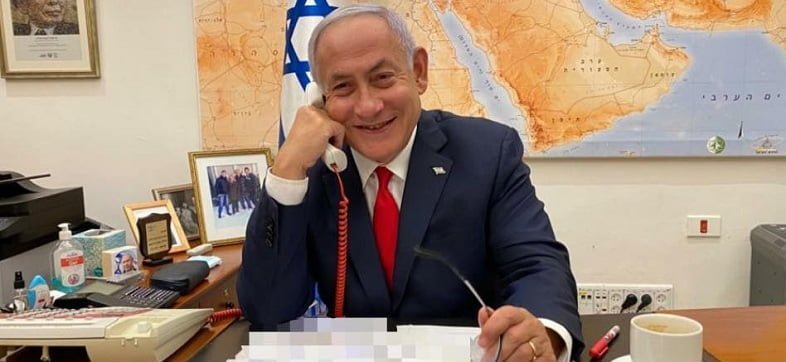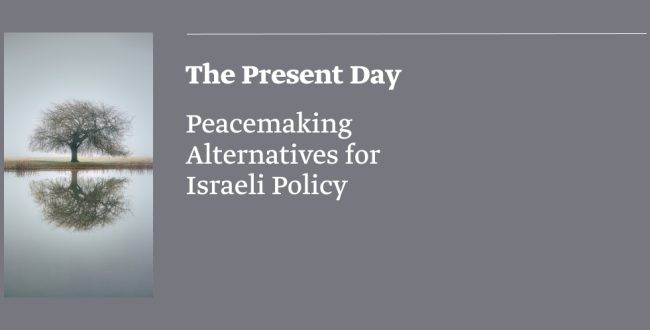President Trump entered office with the declaration that he wanted to divest America from its now three decades preoccupation with the Middle East, as part of his “America First” vision. He chose Saudi Arabia as the first stop on his inaugural overseas trip; his photograph with King Salman and Egyptian President Sisi glowering over an incandescent globe set the stage for America to hand over the keys of regional security to autocratic and monarchical rulers. The notion of America as the purported guarantor of the so-called liberal international order was not a mission he was intent on continuing. Though Trump inherited an already broken U.S. policy in the Middle East from the Obama administration, the resolve to promote international norms of human rights or democratic values would be no longer be defended, nor encouraged.
The Trump administration was largely uninterested in regional politics save for two issues—countering Iran and supporting Israel. Jared Kushner, along with U.S. Ambassador to Israel David Friedman crafted a U.S. policy lauded as the most pro-Israel in America’s history. Whether or not Trump’s policies were “good” for Israel depends on where you sit on the political spectrum, but nonetheless, they delivered Israel many long sought-after objectives. The consensus in Washington is that Biden will not and should not devote the same attention as the Obama or Trump administrations to the Israel-Palestine portfolio. Biden’s first priority is to address more challenging and pressing domestic issues, and the number one foreign policy issue in the region will be negotiating a return to the Iran nuclear deal; a move Israeli leaders have already begun to protest.
Acting U.S. Ambassador to the U.N. Richard Mills outlined the Biden administration’s agenda on the Israeli-Palestinian conflict in a speech to the Security Council last month. The proposal includes renewing funding to the PA and UNRWA, reopening the PLO office in Washington D.C., and the consulate in Jerusalem. The purported goal behind these policies is to preserve the viability of the two-state solution. The speech called on Israel to avoid annexation, settlement building, and demolition of Palestinian homes beyond the Green Line. addressing the Palestinians, Mills referred to the issue of monthly welfare payments to Palestinian prisoners and martyrs’ families, known in Washington ignominiously as “pay to slay,” which reports indicate, the Palestinians have already begun to address.
While these proposals are designed to reverse the skewed Trump administration policies, they represent the bare minimum required to return to the status quo ante. Mill articulated the basic calculation that investing high-level personnel, such as a dedicated special envoy, would be futile because “respective leaderships are far apart on final-status issues, Israeli and Palestinian politics are fraught, and trust between the two sides is at a nadir.” He concluded his speech by applauding the normalization agreements between Israel and the Arab world, and that the U.S. will continue to urge other countries in the same direction because they hope “normalization can proceed in a way that unlocks new possibilities to advance a two-state solution.”
Washington has excused itself from the responsibility of principal mediator, and Biden’s modest policy proposal proves they want to avoid sparking any major dispute on the Israeli-Palestinian relationship. Despite being limited in scope, the success of the individual policies is not a fait accompli, nor are they enough to achieve the larger goal of keeping the two-state solution on life support until reality on the ground progresses. The following sections will outline three key areas where Biden’s policy will face challenges.
The Status of Jerusalem
Secretary of State Anthony Blinken, when asked in his Senate confirmation hearing made it clear that the U.S. Embassy will remain in Jerusalem, and that they do not intend to reverse the Trump administration’s decision to recognize Jerusalem as the capital of Israel. This move signaled the tacit U.S. acceptance of Israeli sovereignty over all of Jerusalem, amounting to a legitimization of Israel’s control over occupied East Jerusalem. Biden has the opportunity to undo this by reaffirming the stipulations agreed upon in the 1993 Oslo Accords Declaration of Principles, where East Jerusalem is a core-final status issue to be resolved by bilateral negotiations. One step further would be to announce East Jerusalem as the capital of a future Palestinian state; though that would mean wading into precarious waters and is sure to spark a harsh Israeli response.
The Israeli government will push back against the plan to re-open the U.S. consulate in East Jerusalem which was merged into a subunit of the U.S. Embassy in Jerusalem in 2019. Outgoing Ambassador to Israel David Friedman, in his last speech to the Knesset Foreign Affairs Committee, made the case against the re-opening, arguing that a consulate is redundant since the city already hosts an American embassy. There is also a legal debate as to whether the U.S. is allowed to do so, and the move will be logistically impossible to carry out without Israeli approval.
Opening a consulate in East Jerusalem has both practical and symbolic implications: it would create an independent channel between the Palestinians and the State Department and signal the U.S. views East Jerusalem as the capital of a future Palestinian state. It would go a long way in resetting the U.S. relationship with the Palestinians and re-affirming the internationally agreed upon parameters of the two-state solution, which were undercut by the Trump administration’s refashioning in the “Peace to Prosperity” peace initiative. Failure to re-open the consulate and thereby allowing Israel’s continued unfettered control over all of Jerusalem proves the Biden’s administration’s claim of support for the two-state solution is ineffectual.
The Future of the Abraham Accords
Another legacy of the Trump administration that Biden will have to deal with are the four normalization agreements brokered by Jared Kushner between Israel and the United Arab Emirates, Bahrain, Sudan and Morocco. Known as the Abraham Accords, these deals undercut one of the Palestinians only remaining points of leverage outlined in the Arab Peace Initiative, the promise of full normalization of relations between the Arab States and Israel contingent on the establishment of a Palestinian state within 1967 borders. The Emiratis have effectively destroyed the Arab Peace Initiative, justifying their decision with the claim that in return for peace, Israel agreed to stop it’s purported plans for annexation of territories in the West Bank. In return, the Emiratis received a commitment from the U.S. to sell up to 50 F-35 Joint Strike Fighter, as well 18 MQ-9 Reapers and advanced munitions, totaling over $23 billion. The other countries who signed normalization deals also received inducements from the U.S., Sudan was removed from the list of state-sponsors of terror, and Morocco granted recognition of sovereignty over the Western Sahara. The deals were brokered to advance specific strategic national interests, forsaking any commitment to advancing the Palestinian national cause.
Touted by Netanyahu and Trump as historic moves, signaling the ““dawn of a new Middle East,” Biden has also expressed strong support these deals. Deputy national security advisor Jake Sullivan reiterated the administration’s belief that the agreements reflect a positive development for U.S. national interests and security and economic development in the region. And yet, the State Department announced the deals were under review to ensure the new administration has a clear understanding of the commitments involved. This includes the F-35 sales, temporarily on hold with reassurances that this is routine administrative procedure. While these deals enjoy bi-partisan Congressional support, arms sales to the Saudis and Emiratis have become a flashpoint due to the continuing devastation of the now decade-long war in Yemen, made possible in large part thanks to U.S. weaponry. In July 2019, Trump vetoed bi-partisan congressional efforts to stop the ongoing sales of weapons to the Gulf worth billions of dollars. Biden announced he is stopping U.S. military aid to the Saudi-led coalition in Yemen, though the details remain murky. In addition, the U.S. re-imposed a ten-percent tariff on UAE steel which Trump had lifted in January. Despite this, it is unlikely the Emiratis would renege on the agreement; normalization provides them a new partner in their anti-Iran coalition, and a strengthened relationship with Washington. As for Riyadh, some are contemplating the possibility that the road to Washington leads through Jerusalem, and in Jerusalem, normalization with Saudi Arabia remains the gold standard. Nonetheless, this path appears unlikely in the near future as long as King Salman remains on the throne.
No Stopping the Settlements
In 2019, the State Department reversed a long-held U.S. position not to take sides on the legality of Israeli settlements in the West Bank by declaring settlements were “not per se inconsistent with international law.” This move coalesced with Kushner’s peace plan which greenlighted Israeli annexation of some thirty percent of the West Bank. Biden does not intend to take this deal off the table, and the administration will face its first test on this issue with tenders issued for 1,257 housing units to be built in the controversial Givat Hamatos neighborhood of East Jerusalem, which connects Jerusalem to Bethlehem and the southern West Bank. If the settlement is completed, it would make a contiguous Palestinian capital in East Jerusalem all but impossible. Netanyahu has refrained from moving forward with these plans in the past due to robust international condemnation, and the EU has already expressed its grave concern. Beyond issuing a statement of opposition, Biden is unlikely to move forward any more substantive actions to deter settlement building such as a settlement freeze. While other presidential candidates had floated the idea of conditioning U.S. aid on an end to settlement expansion, Biden is categorically opposed.
Conclusion
In choosing a modest, middle-way approach, Biden is implicitly accepting the Trump administration’s wrecking of America’s chief role in Israeli-Palestinian peacemaking. Instrumentalizing U.S. policy to advance Israel’s far-right settler agenda and discarding internationally agreed upon parameters have altered the facts on the ground in ways that threaten, if not eradicate, the viability of the two-state solution. Reviving the U.S.-Palestinian relationship and upgrading its status to more than a satellite of the conflict is a significant goal. But it is impossible to judge the impact of these individual policies, as important as they may be for the welfare of Palestinians, apart from the larger picture of whether these achievements will be enough to preserve the future of a two-state solution. In the meantime, Congress passed a $250 Million funding package for Israeli-Palestinian peace and reconciliation projects and plans to bolster the Palestinian economy. While this news does not offer much short-term hope, and pales in comparison to high-level diplomatic efforts, U.S. leadership may be forging a new approach from its former self-assured hubris, tailoring its assumptions and policies to fit a radically altered Middle Eastern reality.
















